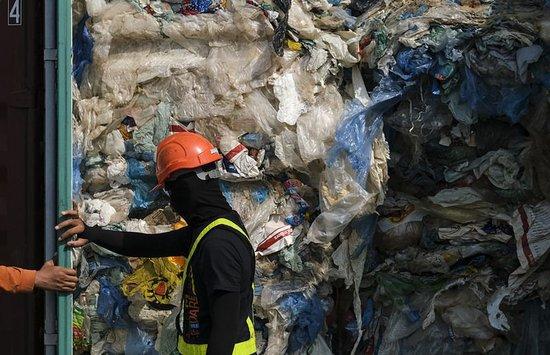
[Reported by Wang Kaiwen for Observatorist Network] Amid the global trade war initiated by the Trump administration, another “trade war” is quietly unfolding, but this time, the protagonists are discarded plastic bottles and candy wrappers.
“The United States is exporting a large amount of plastic waste overseas, and Malaysia refuses to accept it,” according to reports from The New York Times and the Los Angeles Times among other American media outlets. Since July 1st, Malaysia has banned the import of plastic waste from countries including the United States, causing major difficulties for the country that dominates the export of waste.
The report indicates that since China began banning the import of foreign waste in 2018, Malaysia has become the main destination for the export of American waste, with the United States increasingly relying on Malaysia and other countries to handle its plastic waste.
Data from the non-profit organization Basel Action Network tracking the issue of plastic waste shows that, as of 2024 alone, US recycling companies have transported over 35,000 tons of plastic waste to Malaysia.
In 2024, Malaysia seized more than 100 containers arriving from Los Angeles, marked as “raw materials,” which actually contained hazardous waste. At that time, Nenazmi, the Minister of Natural Resources and Environmental Sustainability of Malaysia, stated: “We do not want Malaysia to become a dumping ground for the world.”
On May 28th, 2019, local time, workers at Bagan Port in Malaysia showed the media containers filled with plastic waste.
According to the newly revised Customs Law of Malaysia, the country will no longer accept plastic waste and hazardous waste from countries that have not ratified the Basel Convention.
The Basel Convention is an international convention aimed at controlling the transboundary movement of hazardous waste. Currently, there are 191 signatories and organizations. As one of the world’s largest exporters of waste plastic, the United States is one of the few countries that have not ratified the Basel Convention.
According to reports, Malaysia will continue to accept plastic waste from countries that have ratified the Basel Convention, but it has set strict restrictions, such as limiting them to only one type of plastic and ensuring that the pollution rate does not exceed 2%. Additionally, it ensures that these imported waste plastics can be recycled rather than discarded. The New York Times states that achieving such standards poses a significant challenge for plastic waste collected from consumers.
Steve Wong, CEO of Fukutomi, a global plastic recycling company, stated in an email to clients that the transportation of waste plastics to Malaysia has “basically ground to a halt.”
The new policy in Malaysia is viewed by American media as a “ripple effect” of China’s ban on the import of foreign waste since 2018. Before the ban on foreign waste was implemented, China had received about half of the world’s waste plastics and paper for years.
As China fully prohibits the import of foreign waste, Western countries are concerned about the continuous accumulation of plastic waste.
The New York Times mentioned that the United States’ recycling rate for its discarded plastics is less than 10%. The remaining waste either ends up being landfilled or incinerated, or transported overseas. Despite the emergence of some new destinations, more and more countries are starting to refuse to accept these wastes. Earlier this year, Thailand and Indonesia also announced their ban on importing plastic waste.
In the view of Tony R. Walker, a professor at the School of Resources and Environmental Sciences at the University of British Columbia, Canada, China’s ban “has caused a stir in the global trade of plastic waste,” and other countries that receive waste plastics “are soon overwhelmed,” with most of the waste eventually dumped into landfills or incinerated, or even directly thrown into natural environments.
Walker stated that many people in wealthy countries might believe their hard-sorted plastic has been recycled, yet many of these plastics have not entered the recycling system but are instead disposed of as waste.
Kate O’Neill, a professor of Environmental Science, Policy, and Management at the University of California, Berkeley, commented, “The recycling industry has not fully adapted to the impacts of the previous wave, so these exports remain necessary.” She believes that Malaysia’s ban may mean that plastic waste is starting to flow into other countries with weaker processing capabilities.
Jan Dell, the chair of the anti-plastic waste organization “Last Beach CleanUp” located in Laguna Beach, California, expressed appreciation for Malaysia’s decision.
In an email, she wrote, “We call on cities, waste recycling companies, intermediaries, and shipping companies to respect Malaysia’s sovereign laws and immediately cease all transportation of plastic waste. These materials must not be transported to other impoverished countries.”
Jim Puckett, founder of the BASF Action Network, also welcomed Malaysia’s decision. He told the Los Angeles Times, “This ‘recycling’ is more trouble than it’s worth because only a small portion of the exported plastic is actually recycled.”
“Recycling exported plastic waste is entirely a scam, and it’s heartening that the United States’ ‘contribution’ to this plastic waste game is gradually being banned,” Puckett said.